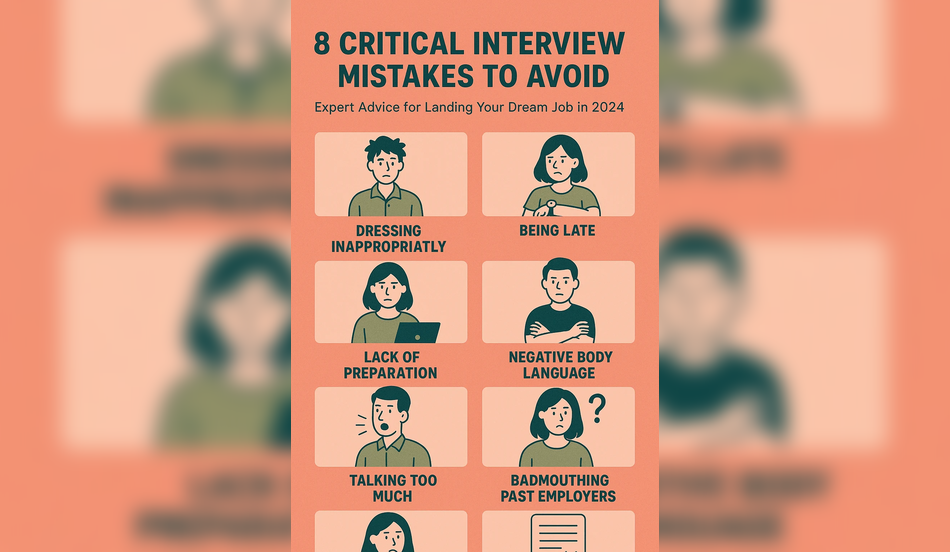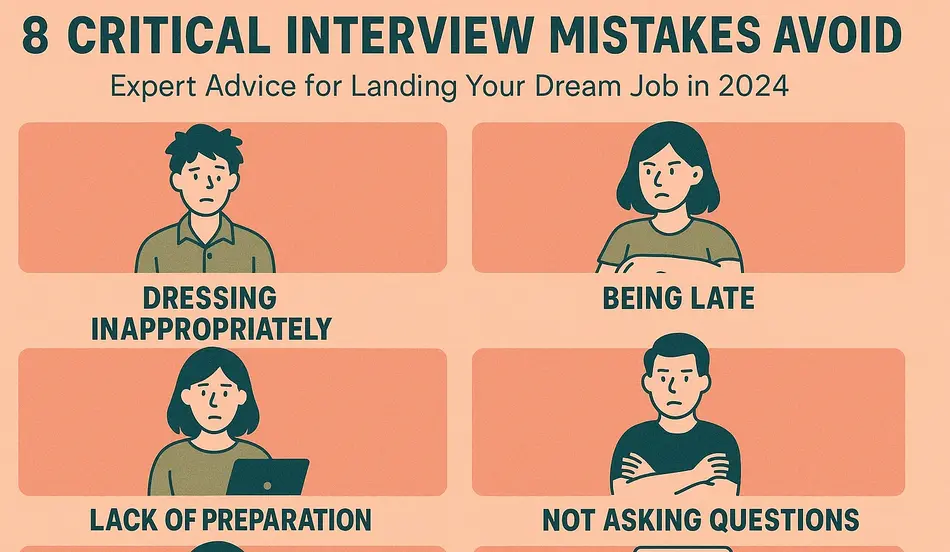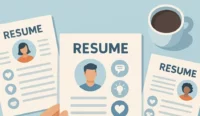Introduction: The Make-or-Break Moments in Job Interviews
In today’s competitive job market, landing an interview is only half the battle. What you say—or don’t say—during those crucial minutes can determine whether you receive a job offer or a rejection email. Understanding the interview mistakes to avoid is essential for job seekers at all career levels. As an HR expert and job search coach with years of experience conducting interviews, I’ve witnessed countless candidates sabotage their chances by making preventable verbal missteps.
Table of Contents
The 8 Critical Interview Mistakes That Cost Candidates Job Offers
1. Badmouthing Previous Employers
One of the most damaging interview mistakes to avoid is speaking negatively about your current or former employer. No matter how justified your grievances might be, criticizing a previous workplace sends immediate red flags to interviewers.
When you badmouth former employers, hiring managers wonder:
- Will you speak negatively about their company in the future?
- Are you difficult to work with or unable to resolve conflicts professionally?
- Do you lack discretion and professional boundaries?
Real-world example: During an interview I conducted, a candidate volunteered that they were leaving their current position because the company hadn’t paid them for two months. While this situation was undoubtedly frustrating, sharing this information reflected poorly on the candidate’s professional judgment.
What to say instead: Focus on growth opportunities and positive aspects of the new role. “I’m seeking an environment where I can further develop my skills in [relevant area]” or “I’m excited about the opportunity to contribute to [specific company initiative].”
2. Criticizing Current or Former Managers
Similar to badmouthing employers, criticizing your boss is a major interview mistake to avoid. Even if your supervisor’s management style is the primary reason you’re seeking new employment, an interview is not the place to air these grievances.
When you criticize your manager, you:
- Appear difficult to manage
- Suggest you might have trouble with authority
- Demonstrate poor emotional intelligence
Remember that your interviewer may one day be your manager—showing that you speak negatively about supervisors doesn’t inspire confidence.
What to say instead: Discuss your interest in different leadership styles or management approaches that align with the prospective company’s culture. “I thrive in environments with collaborative leadership and clear communication channels.”
💼 Hiring?
Need qualified candidates who know how to present themselves professionally? Post jobs for free with WhatJobs and connect with talent that understands modern communication and workplace readiness.
3. Oversharing Personal Information
An interview is a professional exchange, not a therapy session. Revealing too much personal information is an interview mistake to avoid that many candidates make when nervous.
Inappropriate personal details include:
- Relationship or family problems
- Financial difficulties
- Personal conflicts
- Living arrangements (beyond basic commute considerations)
Real-world example: A candidate once shared that they were going through a divorce and needed the job to gain financial independence from their spouse—information completely irrelevant to their qualifications.
What to say instead: Keep responses focused on professional experiences, skills, and career goals. When asked about personal matters, redirect gracefully to job-relevant information.

4. Discussing Medical Issues Unnecessarily
Unless you’re requesting a reasonable accommodation, bringing up medical conditions or health history is an interview mistake to avoid. Not only is this information irrelevant to your qualifications, but it may inadvertently bias the hiring process.
Employers are legally prohibited from making hiring decisions based on medical information, so introducing these topics creates an uncomfortable situation for interviewers.
What to say instead: Focus on your ability to perform the essential functions of the role. If you require accommodations, address these only after receiving a job offer.
5. Expressing Desperation for the Position
While enthusiasm for the role is positive, expressing financial desperation or begging for the job is a serious interview mistake to avoid. Statements like “I really need this job” or “I haven’t been employed for months” shift the focus from your value to the company to your personal needs.
What to say instead: Demonstrate genuine interest in the specific role and company. “I’m particularly excited about this position because it aligns with my expertise in [relevant skill] and I believe I could make significant contributions to [specific company goal].”
6. Undermining Your Own Qualifications
Self-deprecation has no place in a job interview. Saying “I don’t have enough experience” or “I don’t have all the required skills” is an interview mistake to avoid that immediately undermines your candidacy.
Remember: The hiring team reviewed your resume and invited you to interview because they saw potential in your qualifications. Don’t talk them out of their initial positive impression!
What to say instead: Highlight the relevant experience and transferable skills you do possess, and demonstrate your capacity to learn quickly. “While I haven’t used [specific tool] extensively, my experience with [similar tool] has given me a strong foundation, and I’m a quick learner when it comes to new technologies.”
7. Asking What the Company Does
Failing to research the company before your interview signals a lack of preparation and interest—a major interview mistake to avoid. In today’s digital age, there’s no excuse for not having basic knowledge about a prospective employer.
What to do instead: Thoroughly research the company before your interview. Review their:
- Website and mission statement
- Recent news and press releases
- LinkedIn profile and employee posts
- Products or services
- Company culture and values
Then, ask informed questions that demonstrate your research and genuine interest: “I noticed your company recently launched [product/initiative]. How does this align with your long-term strategic goals?”
8. Asking “When Do I Start?” Prematurely
Presuming you’ve got the job before receiving an offer is an interview mistake to avoid that can make you appear arrogant or unprofessional. The hiring process involves multiple considerations beyond the interview itself.
What to say instead: Express continued interest in the position and ask about next steps in the hiring process. “I’m very interested in this opportunity. Could you share what the timeline looks like for making a decision?”
How to Prepare for Interview Success
Avoiding these interview mistakes is just one part of interview preparation. To truly stand out:
- Research the company thoroughly, including recent news and developments
- Practice answers to common interview questions using the STAR method (Situation, Task, Action, Result)
- Prepare thoughtful questions that demonstrate your interest and knowledge
- Review the job description and prepare examples that highlight relevant skills
- Conduct mock interviews with a friend or career coach for feedback
Turning Interview Opportunities into Job Offers
Mastering interview communication is a skill that pays dividends throughout your career. By avoiding these common interview mistakes and focusing on presenting your qualifications confidently and professionally, you’ll significantly increase your chances of receiving job offers.
Remember that interviews are a two-way street—they’re not just about avoiding mistakes but also about determining if the role and company are the right fit for your career goals and work style.
🎯 Find Your Next Career Opportunity
Ready to put these interview skills to use? Explore thousands of job opportunities across industries and locations on WhatJobs.
From entry-level positions to executive roles, find the perfect next step in your career journey — all in one place.
👉 Browse Jobs on WhatJobs NowFAQ
What are the most common interview mistakes to avoid for first-time job seekers?
First-time job seekers should be particularly careful to avoid interview mistakes to avoid such as appearing unprepared, speaking negatively about educational experiences, underselling transferable skills, or failing to research the company thoroughly. Focus on highlighting your eagerness to learn, adaptability, and relevant projects or internships that demonstrate your capabilities. Remember that enthusiasm and genuine interest in the role can compensate for limited work experience.
How can I recover if I make one of these interview mistakes to avoid during my conversation?
If you catch yourself making an interview mistake to avoid, the best approach is to acknowledge it briefly and redirect the conversation. For example, if you find yourself starting to criticize a former employer, you might say, “I apologize—that didn’t come out as intended. What I meant to emphasize was my desire to work in an environment with more collaborative leadership, which is something I admire about your company.” Don’t dwell on the mistake; instead, refocus on your qualifications and fit for the role.
Are there different interview mistakes to avoid depending on the industry or position level?
Yes, certain interview mistakes to avoid may vary by industry or position level. For technical roles, downplaying technical skills or being unable to explain past projects can be particularly damaging. For leadership positions, failing to demonstrate strategic thinking or team management experience are serious mistakes. Research industry-specific expectations before your interview and prepare examples that showcase relevant expertise for the particular role you’re pursuing.
How do virtual interview mistakes to avoid differ from in-person interview mistakes?
Virtual interviews present unique opportunities for interview mistakes to avoid, including technical difficulties, inappropriate virtual backgrounds, poor lighting, distracting environments, or appearing unfamiliar with the video platform. To avoid these issues, test your technology beforehand, choose a professional, well-lit setting, eliminate potential interruptions, and maintain the same level of professional appearance and body language you would in person. Remember that virtual interviews require extra attention to engagement cues since some non-verbal communication may be less apparent.






